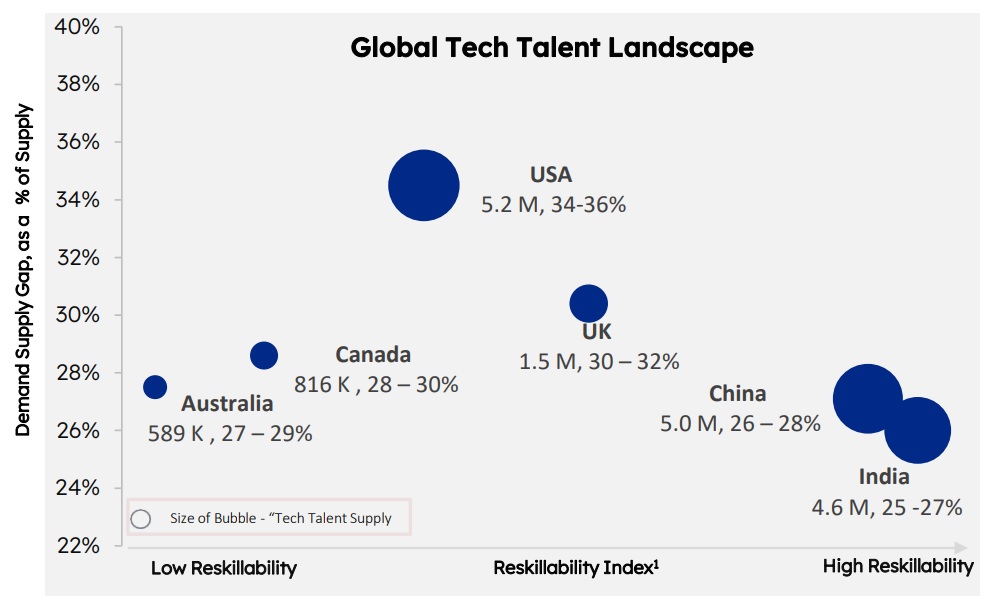AI & Machine Learning Specialists, Sustainability Specialists, Business Intelligence Analysts and Information Security Analysts are few of the jobs where the net job creation (jobs created less jobs displaced) is expected to be the highest during 2023-2027

FinTech BizNews Service
Mumbai, December 31, 2023: APAC Region is observed to be moving faster in harnessing data and analytics. In the Americas, only 24% of organizations reported a significant increase in profitability and performance from investments in data and analytics; for EMA, it was 28%, and APAC was the highest at 35%, reveals 'nasscom Digital Skills survey', released on 30 Dec, 2023.
To assess the Digital Skilling journey of the technology industry in India, nasscom, in collaboration with KPMG, launched the Digital Skills Survey in October 2023. The study based on 'nasscom Digital Skills survey' covers the pervasiveness of digital skilling in the Indian Technology Industry, providing insights into the leading practices of organizations in strengthening their talent pool in digital technologies, learning platforms utilized, academic partnerships built along with success stories. The insights presented in this study is primarily based on a Digital Skills Survey conducted between September to October 2023 and case studies collected from nasscom member companies.
Key Highlights
Growing Global demand for Digital Skills and Global Skill Gap
Increased integration of technology with business has resulted in the growing demand for digital skills across the globe, which needs to be fulfilled. As per a survey conducted by WEF (Future of work report 2023), the fastest-growing roles today are driven by technology, digitalization and sustainability. AI & Machine Learning Specialists, Sustainability Specialists, Business Intelligence Analysts and Information Security Analysts are few of the jobs where the net job creation (jobs created less jobs displaced) is expected to be the highest during 2023-2027.
There is immense opportunity to address and bridge the digital skills divide prevailing in most economies. This divide represents the gap between the growing demand for digital skills, in proportion to the level of industrial development, and the current capacity of policymakers, educational institutions, and corporate trainers to effectively respond to this talent deficit and deliver the necessary skills. Tech talent shortage is a global phenomenon- India’s tech talent demand supply gap (25- 27%) is the lowest among top tech locations such as USA, China, UK. 64% is India’s overall Digital Competitiveness Score (on 100), Ahead of every BRICs nations besides China.
Prominence of Digital Skilling
Moreover, the average half-life of skills is now less than five years—and around 2.5 years in some technology fields, informs the said study. With technology changing so rapidly, the need of the hour is to build a continuous-learning culture and mindset. Organizations, therefore, need to be extremely agile and quick to adopt new approaches to skilling their workforce. They must also invest in setting up & continuously upgrading/updating learning infrastructure – online learning platforms, learning pods, nurture mentors/trainers, online/offline labs for hands-on experience and more. Organizations and individuals must prioritize ongoing technology training & skilling initiatives to ensure their digital skills remain up to date and adaptable to emerging technologies.
Emergence of Complementary Skills
In addition to digital skills, there has been a notable rise in the significance of behavioral and functional skills in the global job market. Analytical thinking and creative thinking are the most important core skills for the workforce in 2023. Resilience, flexibility and agility; motivation and self-awareness; and curiosity and lifelong learning are some of the other skills in high demand. These complementary skills contribute to a more comprehensive and well-rounded talent pool. By nurturing both technological and non-technological proficiencies, organizations will be better placed to adapt to emerging market trends and can build a more resilient workforce.
India's Rise as a Global Digital Talent Hub
Investing in employee skilling is now a board agenda and technology firms are continuously scanning the industry landscape to identify early, emerging trends both in terms of technology developments and market movements. In turn, organization-level skilling roadmaps are also constantly being upgraded to facilitate first-mover advantage (Generative AI is the most recent example of a disruptive technology around which firms are rapidly building relevant skills). By prioritizing skill development, organizations can foster a workforce that is adaptable, innovative, and capable of meeting the evolving demands of the business world. With a focus on right skilling, technology companies are providing the relevant resources to their employees for learning and acquiring the new skillsets. Indian technology firms too are mirroring this sentiment and are taking advantage of the high skillability index of the Indian workforce. Various initiatives in partnership with the academia and the government have been rolled out to meet the demand for relevant digital skills.